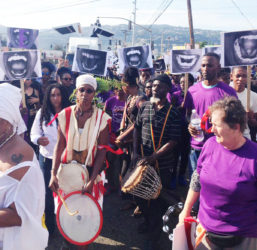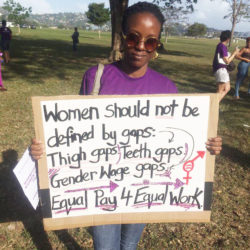Alissa Trotz is Editor of the In the
Diaspora Column
In November 2016, two Barbadian women, Ronelle King and Allyson Benn started what has now become known as the #LifeInLeggings movement, where survivors of various manifestations of violence against women shared their personal experiences, putting a public spotlight on sexual abuse, sexual harassment and other forms of sexual violence throughout the Caribbean.
On Saturday March 11th, in six Caribbean countries (Antigua and Barbuda, The Bahamas, Barbados, Guyana, Jamaica, Trinidad and Tobago), survivors and their supporters took to the streets for International Women’s Day in solidarity with #LifeInLeggings violence (Dominica’s march has been postponed to March 25th due to bad weather that caused landslides, damaged bridges and flash floods). The purpose of the marches, supported by UN Women, is to support survivors of Violence Against Women and Girls (VAWG) and to rally as many NGOs and government agencies as possible to address and end it. As Gabrielle Hosein wrote in her newspaper column in the Trinidad Guardian, “this year’s march is in solidarity with the Life in Leggings movement, started by two young Barbadian women, to break silences around sexual violence. It is in solidarity with the goal of equal pay for work of equal value, equity in terms of women and men’s participation and leadership in business and politics, and women’s economic empowerment. It is also in solidarity with the issues each of us sees as a denial of women’s rights and the solutions we want to see implemented…Women’s rights are everyone’s responsibility and this march is to gather our strength to boldly pursue changes we need.”
Here are brief reports from some of the participating countries:
From Ronelle King, Founder/Director, Life In Leggings, Barbados:

“It’s important that we come together and pledge to end violence against women and girls. Let us look toward the future and make necessary societal changes that begin with ourselves and those around us so that the women and girls yet to come never have to experience what we have. So join us in solidarity with survivors of gender-based violence, in memory of the women and girls who are no longer with us and to reclaim our streets for the future generations of women and girls. Let us unite the Caribbean to change the statistic from 1 in 3 to none in three. The turnout for the march was great. We began and ended with our list of diverse speakers and performers before embarking on a powerful march. Women from all walks of life came out, carried placards and shouted chants such as, ‘I am not… Your sexy friend.’ ‘Consent matters’ ‘I deserve respect.’ Men also came out to support the women. When we chanted ‘my body, my rules’ they echoed, ‘her body, her rules.’ We walked the streets of Bridgetown, passersby especially women stopped to chant with us. Persons came out of stores, persons driving cars slowed down to honk their cars in rhythm with our chants and encouraged us to continue but mostly importantly men in Bridgetown just stopped to listen.”
From Akola Thompson, The Student Society Against Human Rights Violations, Guyana:
“Guyanese women will join with other women throughout the Caribbean to demonstrate for our rights. The #lifeinleggings movement has bravely brought the issue of street harassment of women into the spotlight and demonstrated that there is an audience for fighting back given the spread of the hash tag from Barbados to other nations throughout CARICOM. In Guyana, we march in recognition of the historic achievements women have made worldwide and to continue the struggle for equality. We demand:
1) Stop the Violence against Women and children
2) Free, safe and easily accessible Reproductive Healthcare for all
3) Comprehensive Sex Education in Public Schools
4) Equal Rights for the LGBTQ population
A fair number of women and a handful of men came out to march with us and they were definitely more exuberant about the fight for equality, protection and justice than I thought they would have been. Here in Guyana and across the Caribbean we have a culture of violence that is so hard to shake but more and more people are coming out of that shell and it is great. I saw people at the march yesterday that I know are not usually ones to be involved in social movements and activities and it was great to see them stepping up to the table and demanding their voices be heard.”
From Alicia Wallace, Hollaback! Bahamas:

“Sexual violence is a pervasive issue in the region, particularly as rape culture continues to affect the perception of many, resulting in the trivialization of violence against women and girls. This march is bringing women together, across countries, in acknowledgement of our shared struggle and commitment to ongoing collaboration and movement-building for the dignity, rights, and healing of the women and girls living in the Caribbean. We look forward to taking the next steps together. The Bahamas march was led by the Urban Renewal Music Masters Youth Band, complete with flag spinning and dancing, ending at The Dundas Centre for the Performing Arts with the national anthem. Hosted by media personality and TV talk show host Leslie Lezz Boogie, the day’s activities attracted large groups from the Girl Guides Association of The Bahamas and The University of The Bahamas. The speaker series started with Marion Bethel, speaking on the Women’s Suffrage Movement and The Bahamas and the importance of voting, and closed with a drumming performance. We then held an expo with free activities including self-defense demonstrations, yoga sessions, an art therapy workshop, and a 30-foot story walk. Hollaback! Bahamas received incredible feedback from the women and girls in attendance, many of whom expressed the ongoing need for events of this kind. It was beautiful to see people of all ages listening to the speakers, engaging them one-on-one, and participating in the activities. We were also able to collect donations of toiletries to assist the people — especially women — displaced by a recent dump fire in Nassau, Bahamas. Hollaback! Bahamas is tremendously grateful to the organizations that contributed through sponsorship and participation to make the event possible, including Rotary Clubs of The Bahamas, Bahama Breeze, Bahamas Crisis Centre, Bahamas AIDS Foundation, Cosmosis Institute, Energy Fitness, and The Family: People Helping People. The event proved our ability to come together as a country to share, build, and support, and the regional solidarity is evidence of our potential, throughout the Caribbean, to organize across borders, develop replicable programs, and create our own platforms and solutions. We are grateful to the Life In Leggings time for the vision and extension of this invitation, and the start to building long-term relationships for collaboration and a sustained women-led and women-centered movement in the Caribbean.”
In Jamaica, over 20 women died at the hands of their partners in December 2016 alone. Then, in late December 2016, another watershed moment occurred. A minister of religion in Jamaica was charged with statutory rape of a girl child, leading to calls for a radical shift in how, as a state and society, sexual violence is understood and eliminated. This gave birth to what is now referred to as the #TambourineArmy, which “comprises of a coalition of organisations, women, and Feminists tin Jamaica “that/who have become radically fed up with the culture of silence and inertia around sexual violence in the church and other institutions…and is a survivor friendly and survivor centred movement calling on survivors and the society in general to shatter the culture of silence about sexual abuse, particularly child sexual abuse, while fixing our broken institutions and agencies and making them more survivor friendly.”
The march organized by the Tambourine Army began with a libation, and there were drummers, dancers, percussionists and a flagbearer to clear the way. Participants heard from survivors, including someone now based in Florida, a young man from The Jamaica Forum of Lesbians, All-Sexuals and Gays (J-FLAG) who grew up in an abusive home, and reggae artist, survivor and Tambourine Warrior Tanya Stephens. Michelle Serieux, film maker and Tambourine Army Warrior observed, “One of the most beautiful moments for me yesterday was when I was sitting on the truck. From my vantage point I could see all the different types of people marching alongside the truck, a rasta elder with his cane marching with a mighty stride, a young woman and her baby, two elderly sisters walking side by side, a father supporting his daughter. I absolutely loved the survivor support element, we see you, we hear you, we stand with you. The inclusive support that I witnessed was very beautiful and power filled and I hope the army always remains that support system and haven for all who need it.”
In Trinidad and Tobago, a report by Janelle de Souza in Newsday (Sunday March 12) described hundreds of people attending the march around the Queen’s Park Savannah, which was organized by a coalition of over twenty organisations. According to the Newsday report, “Participating in the Life in Leggings TT: Women’s Rights March and Rally in recognition of International Women’s Day, which was celebrated on March 8, they held signs with various messages including Gender Equality Now; Men of Quality Do Not Fear Equality; Time to Change the Things We Can Not Accept; and Women’s Bodies Are Not Commodities…One of the event’s organisers and co-founder of NGO Say Something, Attillah Springer, told Sunday Newsday people were encouraged to ‘bring their issues’ and she was very excited that they responded to the call and felt comfortable enough to do so. ‘The point of events like this is to raise consciousness. There might be 2,000 cars passing us and 50 percent might not know what we’re talking about but they might be motivated to go and find out if they read a sign or hear a chant…It’s important for us to stand up publicly in a society where silence is perceived as consent in a lot of situations. It’s important for us to stand up for those who can’t stand up for themselves.”
The marches were also supported by Caribbean people in the diaspora (that included the Board, The Urban Alliance on Race Relations, Toronto, Canada; Debbie Douglas, Executive Director, OCASI – Ontario Council of Agencies Serving Immigrants, Toronto, ON, Canada; and the Black Daddies Club in Toronto), who issued a press release joining the call in the region for “Caribbean governments to meet their demands and the demands of women and men across the Caribbean for the following:
allocation of state funds for a shelter for abused women across our countries by the end of 2017.
strengthened restorative justice and psychological support for victims;
“targeted activism” in schools (including colleges and universities), communities and the workplace through funding for public education initiatives about gender based violence and harassment.
work with youth (counselling and mentoring);
strengthened community policing and special training for police on questions of sexual violence so that perpetrators may be held accountable and victims supported.
the use of critical points such as health services for speedier interventions in situations of crisis.”
This is urgent work, and it is necessary that we continue to link these stories, and struggles, up. As Tambourine Army Warrior, Shaneka Hall states of her experience in Jamaica, “It’s one thing to read an article in support of ending violence against women and it’s another to see sparks of support flash across the internet but it’s an entirely different thing to witness the unification of hundreds marching the streets in support of women and girls. The spirit of the people was something that had to be experienced to be understood. You could feel the power when they chanted the affirmations and an even greater force when the survivors accepted them. Oh what a joy it was to see Rastafarians, Christians, gay people, straight people, all in solidarity. The marches have revived hope, and I think it’s safe to say, started a revolution.”






